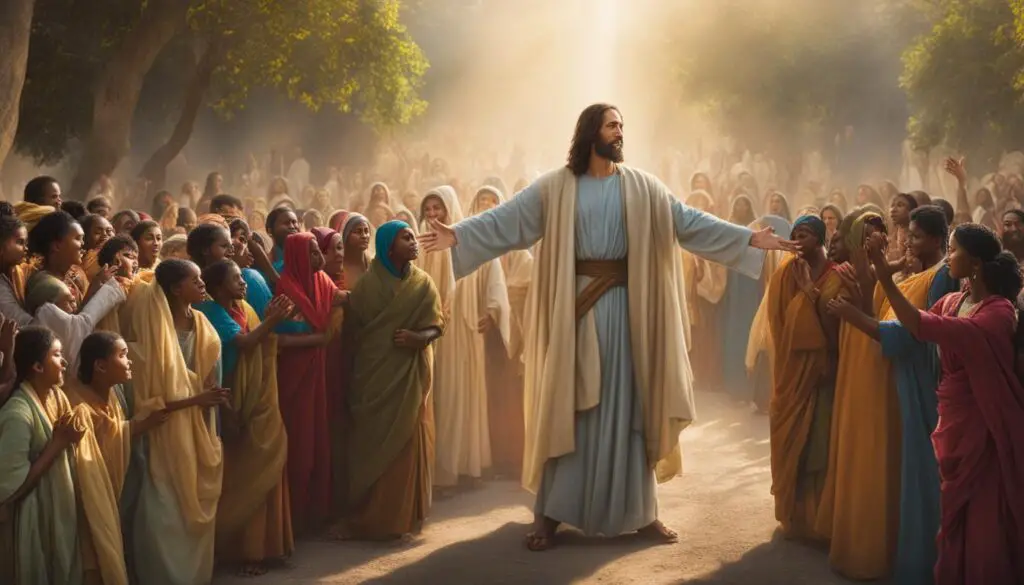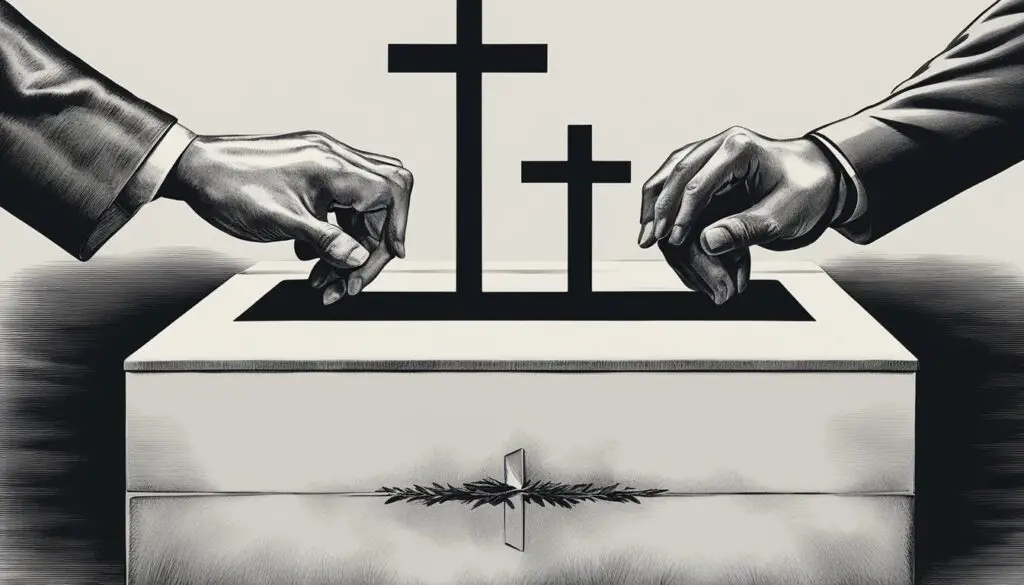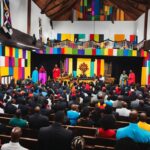Welcome to our comprehensive guide on liberation theology, a powerful movement that addresses social justice through faith activism and religious liberation. In this article, we will delve into the meaning and implications of liberation theology in contemporary society, exploring its origins, key principles, and its relevance today. Join us on this journey as we explore the intersection of faith and justice, and how liberation theology offers new perspectives on addressing inequality, oppression, and the pursuit of a more equitable world.
Key Takeaways:
- Liberation theology emerged in twentieth-century Latin America as a response to poverty and oppression.
- It questions the traditional understanding of Jesus Christ and explores the social dimension of sin.
- The movement emphasizes the Church’s role in serving and advocating for the poor.
- Liberation theology challenges the colonial legacy and promotes decolonization.
- It recognizes social sin and advocates for addressing systemic oppression.
Introduction to Liberation Theology
Liberation theology is a remarkable movement that emerged in Latin America during the twentieth century. It offers a profound and transformative understanding of faith, social change, and the pursuit of justice. At its core, liberation theology challenges conventional interpretations of Jesus Christ as a savior and liberator.
With its roots in Latin American theology, liberation theology seeks to address the economic, political, and social liberation of marginalized communities. It questions the traditional understanding of sin, emphasizing the social dimension of sin and the structural injustices that perpetuate inequality and oppression.
The theology of liberation recognizes the profound connection between faith and social change, advocating for a faith that is actively engaged with the struggles of the poor and the marginalized. It calls on the Church to be a voice for the voiceless and a catalyst for social transformation.
“Liberation theology challenges us to examine the way we understand and practice our faith. It reminds us that Christianity is not simply a personal matter, but also a call to engage with the world and seek justice for all.”
From Colonial to Liberating Faith
Colonialism has left a profound impact on societies around the world, shaping not only political and economic structures but also religious beliefs and practices. The experience of colonization often led to the suppression and marginalization of indigenous spirituality and cultural traditions. However, liberation theology seeks to challenge this legacy and promote a decolonizing faith that embraces and empowers marginalized communities.
In the context of liberation theology, decolonization refers to the process of dismantling the systems of colonial oppression and reclaiming indigenous spirituality and identity. It recognizes the importance of honoring and integrating indigenous wisdom and practices into religious frameworks. This involves acknowledging the spiritual connection to the land, valuing communal relationships, and challenging the dominant narratives that perpetuate colonial mindsets.
“Decolonization is not just about political independence, but also about decolonizing the mind, spirit, and theology.”
Indigenous spirituality plays a significant role in the liberation theology movement. It offers a rich source of wisdom and resilience, inspiring alternative ways of understanding faith and justice. The inclusion of indigenous spirituality in liberation theology deepens our understanding of the interconnectedness of social, environmental, and spiritual concerns.
Table: Comparison of Colonial and Liberating Faith
| Colonial Faith | Liberating Faith |
|---|---|
| Imposed by colonizers | Embraces indigenous spirituality |
| Reinforces power dynamics | Challenges hierarchical structures |
| Suppression of indigenous cultures | Advocates for cultural preservation |
| Supports colonial economic systems | Promotes economic justice |
By recognizing the impact of colonialism and engaging with indigenous spirituality, liberation theology seeks to foster a more inclusive and empowering faith that addresses the historical injustices and paves the way for a more just and equitable future.
Social Sin and Liberation
Liberation theology recognizes that sin is not only personal but also social. It critiques the structures of injustice and explores ways to address systemic oppression. It advocates for a preferential option for the poor, emphasizing the need to prioritize the well-being and dignity of marginalized individuals and communities.
In the words of liberation theologian Gustavo Gutiérrez, “Social sin is not just the sum of individual sins. It is the expression of a social structure in which injustice is embedded and perpetuated.” This understanding of sin goes beyond individual actions and focuses on the larger systems and structures that perpetuate injustice, inequality, and oppression. Liberation theology challenges us to examine the root causes of these social sins and work towards their transformation.
To better understand the concept of social sin, let’s take a closer look at the structural injustices that exist in society today:
| Forms of Structural Injustice | Examples |
|---|---|
| Economic Inequality | Wage disparities, lack of access to education and healthcare, corporate greed |
| Racial Discrimination | Systemic racism, racial profiling, disparities in criminal justice system |
| Gender Inequality | Gender wage gap, lack of representation in leadership positions, gender-based violence |
| Environmental Exploitation | Deforestation, pollution, climate change |
These examples illustrate how social sin manifests itself in various aspects of society. Liberation theology calls on us to challenge and transform these structural injustices through acts of solidarity, advocacy, and social activism. It emphasizes the importance of addressing the underlying systems that perpetuate oppression rather than simply addressing the symptoms.
By recognizing and confronting social sin, we can work towards creating a more just and equitable society. As a people of faith, it is our responsibility to stand in solidarity with those who are marginalized and oppressed, and to actively work towards dismantling the structures that perpetuate social sin. In doing so, we can contribute to the liberation of all individuals and communities.
Jesus the Liberator
Liberation theology offers a fresh perspective on Jesus Christ, portraying him not only as a savior but also as a liberator. This interpretation explores the profound implications of Jesus’ teachings and actions for the liberation of humanity from various forms of bondage. It emphasizes the transformative power of Jesus’ message, particularly in relation to salvation and liberation.
In liberation theology, salvation goes beyond the personal realm and encompasses the liberation of society from systemic oppression and injustice. It recognizes that the teachings of Jesus have socio-political implications, calling for the dismantling of oppressive structures and the establishment of justice and equality. As stated by Gustavo Gutiérrez, a prominent liberation theologian, “To know God is to do justice.”
“To know God is to do justice.” – Gustavo Gutiérrez
This understanding of Jesus as a liberator has profound implications for believers. It challenges them to actively engage in the pursuit of justice and liberation for all. It inspires a commitment to address social issues and work towards creating a more just and equitable society.
Overall, liberation theology presents Jesus Christ as an embodiment of liberation. It calls on individuals and communities to follow his example, proclaiming freedom from oppression, and working towards the fulfillment of God’s kingdom on earth.

Table: Salvation and Liberation in Liberation Theology
| Concept | Meaning |
|---|---|
| Salvation | Redemption from sin and eternal life |
| Liberation | Freedom from all forms of oppression and injustice |
| Scope | Personal and communal |
| Focus | Individual salvation and societal transformation |
| Action | Repentance, faith, and works of justice |
| Goal | Personal salvation and the establishment of God’s kingdom on earth |
The Church of the Poor
Liberation theology places a strong emphasis on the role of the Church in advocating for and serving the poor. It calls for a radical transformation of the Christian community and promotes solidarity in the pursuit of poverty alleviation. Through this approach, liberation theology seeks to address the root causes of poverty and create a society that values the well-being and dignity of all individuals.
Central to the concept of the Church of the Poor is the belief that the Church should actively engage with marginalized communities and work towards their liberation. This requires a shift in focus from individual salvation to collective liberation. The Church is seen as an agent of change, fostering a sense of community and providing support and resources to those in need.
In practicing solidarity, the Church works alongside the poor, listening to their voices and respecting their agency. It aims to challenge the systems of injustice that perpetuate poverty and inequality. Solidarity goes beyond charity and aims to create lasting change by addressing the structural issues that contribute to poverty.
By embracing the principles of the Church of the Poor, liberation theologians believe that the Church can play a pivotal role in advocating for social justice and working towards a more equitable society. Through collective action and a commitment to the well-being of all, the Church can be a powerful force in the fight against poverty and inequality.
Spirituality: Faith, Politics, and Discipleship
Spirituality is a vital aspect of liberation theology, intertwining faith, politics, and discipleship. It explores the connection between personal beliefs and their transformative impact on society. Liberation theologians emphasize that faith should not be confined to private worship but should inform and inspire political engagement and acts of social justice.
At the core of the spirituality of liberation is a profound understanding of the Gospel message and the teachings of Jesus Christ. It recognizes that faith is not separate from the realities of the world but is intrinsically linked to them. It calls for believers to embrace their role as disciples, actively working towards the liberation and well-being of all people.
The intersection of faith and politics is a key focus for liberation theologians. It acknowledges that political systems have a significant impact on the lives of people, particularly those who are marginalized and oppressed. Therefore, a spirituality of liberation challenges believers to examine their political affiliations and actively engage in shaping policies that promote justice, equality, and human dignity.
Discipleship: Living Out the Call to Justice
Discipleship in the context of liberation theology involves embodying the values and teachings of Jesus Christ in everyday life. It requires believers to actively seek justice, challenge oppressive systems, and stand in solidarity with those who are marginalized. Discipleship is not just about personal salvation but also about working towards the liberation and empowerment of others.
By integrating faith, politics, and discipleship, liberation theology offers a holistic approach to spirituality that calls believers to be agents of positive change in the world. It encourages individuals to examine their own privileges and biases, to listen to the voices of the marginalized, and to actively work towards a more just and compassionate society.

| Key Elements of Liberation Theology Spirituality | Implications for Faith and Politics |
|---|---|
| Integration of faith and social justice | Active engagement in political advocacy and activism |
| Emphasis on solidarity with the poor and marginalized | Working towards systemic change and dismantling oppressive structures |
| Recognition of the political dimension of sin | Challenging unjust policies and advocating for the rights of all individuals |
| Commitment to liberation and empowerment | Promoting social, economic, and political equality |
Liberation Theology and Its Critics
Liberation theology, with its emphasis on social justice and activism, has not been without its critics. Various theological controversies have arisen around the movement, particularly from conservative religious groups. These criticisms often stem from ideological differences and concerns about the perceived politicization of theology.
One of the main criticisms leveled against liberation theology is its prioritization of economic and political liberation over spiritual salvation. Critics argue that the movement places too much emphasis on earthly concerns and social activism, detracting from the core message of traditional Christianity. They claim that liberation theology risks diluting the gospel message and losing sight of the individual’s need for personal salvation.
Another point of contention is the perceived Marxist influence on liberation theology. Critics argue that the movement’s focus on addressing systemic injustices aligns too closely with Marxist ideologies, compromising the integrity of Christian theology. They contend that liberation theology blurs the line between faith and political ideology, leading to a distortion of religious teachings and doctrines.
However, supporters of liberation theology counter these criticisms by asserting that their approach is firmly rooted in the gospel and a commitment to justice. They argue that the movement’s focus on social liberation is not at odds with spiritual salvation but rather aligns with the teachings of Jesus, who advocated for the marginalized and oppressed. Liberation theologians see their work as a continuation of Jesus’ mission on earth, emphasizing the need to address both material and spiritual liberation.
Table: Criticisms of Liberation Theology
| Criticism | Counterargument |
|---|---|
| Emphasis on social activism over spiritual salvation | Liberation theology seeks to integrate social justice with spiritual transformation, addressing both earthly and spiritual concerns. |
| Perceived Marxist influence | Liberation theology’s focus on systemic injustice does not equate to Marxist ideology but rather stems from a commitment to social equality and human dignity. |
| Politicization of theology | Liberation theology argues that the gospel inherently has political implications and calls Christians to engage in the pursuit of justice. |
In spite of these criticisms, liberation theology continues to inspire and challenge believers around the world. Its focus on addressing social and economic inequalities resonates with those seeking to live out their faith in a tangible and transformative way.

Liberation Theologies: Expanding the View
While liberation theology originated in Latin America, its influence has spread beyond its initial context, inspiring the development of other liberation theologies that address the intersecting forms of oppression faced by marginalized communities. These include feminist theology, Black liberation theology, and eco-theology.
Feminist theology seeks to challenge and transform patriarchal structures within religious traditions, emphasizing the equality and empowerment of women. It highlights the experiences and perspectives of women in interpreting religious texts and rituals, and advocates for social, political, and economic justice for women.
Black liberation theology emerged as a response to racial injustice and systemic oppression faced by Black communities. It emphasizes the importance of advocacy and activism in the fight against racism and the pursuit of racial equality. Black liberation theology also emphasizes the significance of Black culture, history, and spirituality in the liberation struggle.

Eco-theology focuses on the intersection of faith, spirituality, and ecological responsibility. It highlights the interconnectedness of all living beings and emphasizes the need for environmental justice and the sustainable stewardship of the Earth. Eco-theology explores the spiritual dimensions of environmental issues and calls for transformative action to address the ecological crisis.
Feminist Theology: Key Elements and Contributions
Feminist theology examines gender roles, power dynamics, and the marginalization of women within religious traditions. It critiques patriarchal interpretations of religious texts and seeks to promote gender equality and justice. Some key elements and contributions of feminist theology include:
- Reclaiming the voices and experiences of women in religious narratives and theology.
- Challenging traditional notions of God and exploring the divine in feminine terms.
- Engaging in feminist biblical interpretation to uncover hidden stories and perspectives.
- Advocating for gender-inclusive language and practices in religious rituals and institutions.
- Promoting the full participation and leadership of women in religious communities.
Black Liberation Theology: A Call for Justice
Black liberation theology emerged in response to the historical and ongoing oppression faced by Black communities. It calls for the recognition of Black humanity, the dismantling of racist systems, and the pursuit of racial justice. Some key elements of Black liberation theology include:
- Centering the experiences, struggles, and spirituality of Black people.
- Interpreting the Bible through the lens of liberation and the fight against racism.
- Emphasizing the role of activism and community organizing in the pursuit of racial equality.
- Advocating for reparations and economic justice for Black communities.
- Addressing the intersections of race, class, and gender in the fight against oppression.
Contemporary Applications of Liberation Theology
Liberation theology continues to have a significant impact on contemporary society, serving as a framework for various social justice movements, activism, and advocacy. In a world marked by ongoing inequality and oppression, liberation theology inspires individuals and communities to work towards a more just and equitable society. By understanding the principles and teachings of liberation theology, we can actively engage with the pressing issues of our time and contribute to meaningful change.
Key Aspects of Liberation Theology in Today’s Context
- Contemporary Social Justice Movements: Liberation theology is deeply intertwined with contemporary social justice movements. It provides a theological basis for addressing issues such as racism, sexism, poverty, and environmental degradation. From the Black Lives Matter movement to the fight for gender equality, liberation theology offers insights and moral grounding to these progressive movements.
- Activism and Advocacy: Inspired by the principles of liberation theology, activists and advocates work tirelessly to challenge oppressive systems and structures. They seek to empower marginalized communities, amplify their voices, and demand social, economic, and political justice. Liberation theology serves as a guiding light, motivating individuals and organizations to promote change through direct action, grassroots organizing, and policy advocacy.
- Liberating Theology for All: Liberation theology extends beyond religious boundaries and finds resonance in secular spaces as well. Its call for justice and liberation resonates with individuals of diverse beliefs and backgrounds, fostering cross-cultural solidarity in the pursuit of a more equitable world.
“Liberation theology teaches us that faith without action is empty and that we must actively work towards justice and liberation for all.” – Dr. Maria Hernandez, Liberation Theologian
As we navigate the complexities of the contemporary world, liberation theology continues to provide a moral compass for individuals and communities seeking to create a more just and compassionate society. Its emphasis on collective liberation, solidarity, and advocacy provides valuable insights and guidance for addressing the urgent challenges of our time.
Table: Examples of Contemporary Movements Influenced by Liberation Theology
| Movement | Description |
|---|---|
| Black Lives Matter | A movement advocating for the rights and dignity of Black individuals, challenging systemic racism, and seeking justice for victims of police brutality. |
| Feminism | A movement advocating for gender equality, challenging patriarchal systems, and striving for the fair treatment and empowerment of all genders. |
| Climate Justice | A movement addressing the intersecting issues of environmental degradation and social justice, advocating for sustainable practices and equitable access to resources. |
| Immigrant Rights | A movement fighting for the rights and fair treatment of immigrants, challenging xenophobic policies and advocating for comprehensive immigration reform. |
These movements, among many others, draw inspiration from liberation theology, leveraging its teachings to challenge oppressive systems and bring about transformative change.

Conclusion
Liberation theology bridges the gap between faith and justice, offering a profound impact on society. By challenging our beliefs and actions, it compels us to strive for a more just and equitable world. Liberation theology inspires us to actively participate in the ongoing struggle for liberation, fostering a society rooted in compassion.
This powerful theological framework addresses the deep-rooted issues of inequality, oppression, and systemic injustice. It emphasizes the importance of a preferential option for the poor, urging us to prioritize the well-being and dignity of marginalized individuals and communities.
Through liberation theology, we are called to engage in faith activism and advocate for social change. It serves as a guiding force for contemporary social justice movements, encouraging us to stand up for the rights and equality of all. By understanding and applying the principles of liberation theology, we can contribute to the collective effort in creating a world where justice prevails.
FAQ
What is liberation theology?
Liberation theology is a movement that emerged in twentieth-century Latin America as a response to poverty and oppression. It seeks to address economic, political, and social liberation through a robust and meaningful faith.
What does liberation theology question?
Liberation theology questions the traditional understanding of Jesus Christ as a liberator and explores the social dimension of sin. It also emphasizes the role of the Church in serving and advocating for the poor.
How does liberation theology challenge colonialism?
Liberation theology challenges the colonial legacy and promotes decolonization. It acknowledges the importance of indigenous spirituality and advocates for the inclusion and empowerment of marginalized communities.
What does liberation theology say about sin?
Liberation theology recognizes that sin is not only personal but also social. It critiques the structures of injustice and explores ways to address systemic oppression. It advocates for a preferential option for the poor.
How does liberation theology interpret Jesus Christ?
Liberation theology interprets Jesus Christ as a liberator who came to free humanity from bondage. It examines the relationship between salvation, suffering, and martyrdom, emphasizing the transformative power of Jesus’ teachings and actions.
What role does the Church play in liberation theology?
Liberation theology emphasizes the role of the Church in advocating for and serving the poor. It calls for a radical transformation of Christian community, promoting solidarity and addressing the root causes of poverty.
How does liberation theology connect faith and politics?
Liberation theology explores the intersection of faith, politics, and discipleship. It encourages believers to cultivate a spirituality of liberation, where faith informs and inspires political engagement and acts of social justice.
Has liberation theology faced criticism?
Yes, liberation theology has faced criticism from various quarters, including some conservative religious groups. These criticisms often stem from ideological differences and concerns about the perceived politicization of theology.
What other liberation theologies have been inspired by liberation theology?
Liberation theology has inspired the development of other liberation theologies, such as feminist theology, Black liberation theology, and eco-theology. These perspectives highlight the intersectionality of different forms of oppression and advocate for their liberation.
Is liberation theology still relevant today?
Yes, liberation theology continues to have relevance in contemporary society. It serves as a framework for social justice movements, inspiring activism and advocacy for the rights and well-being of marginalized groups.
What impact does liberation theology have?
Liberation theology offers a powerful and impactful association between faith and social justice. It challenges us to examine our beliefs and actions in the pursuit of a more just and equitable world. By understanding liberation theology, we can contribute to the ongoing struggle for liberation and a more compassionate society.
















